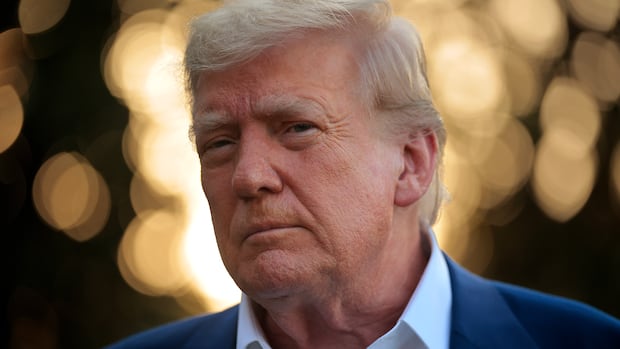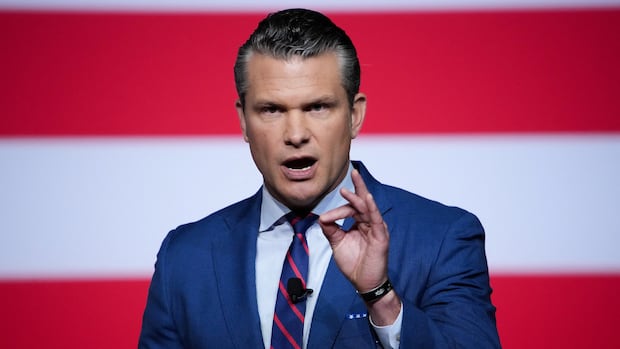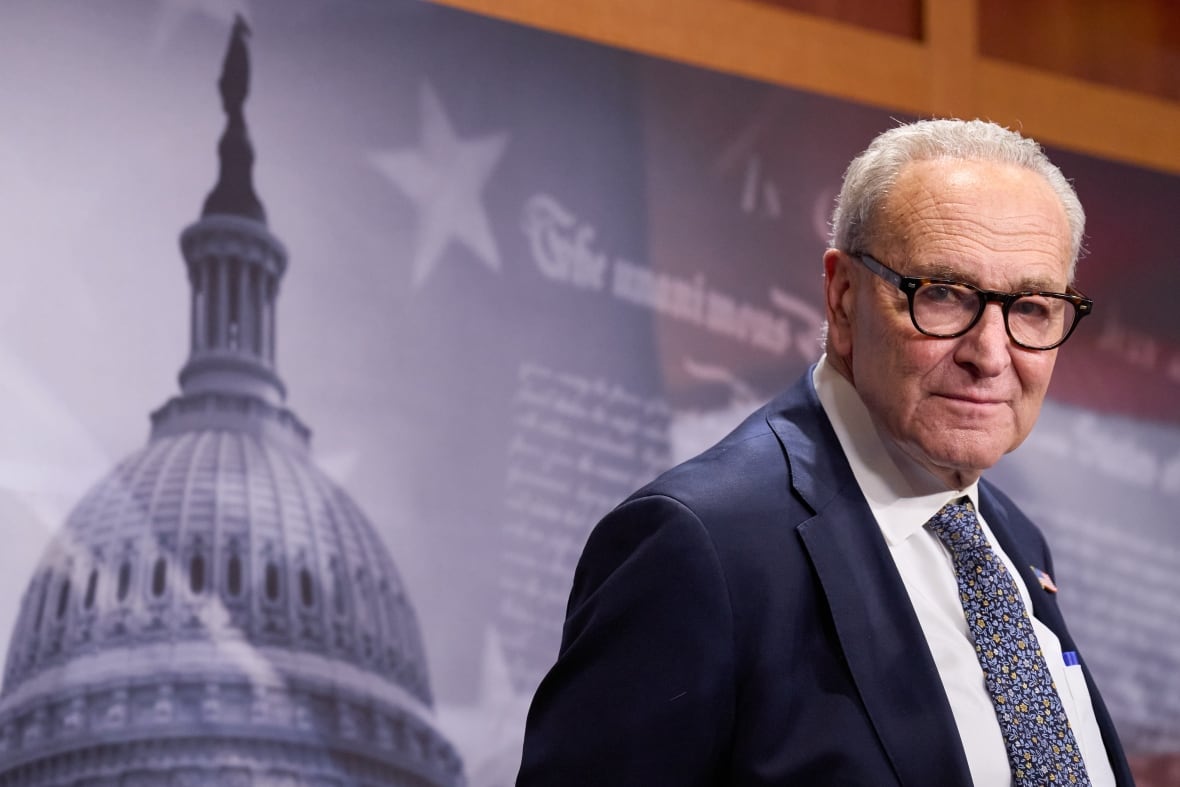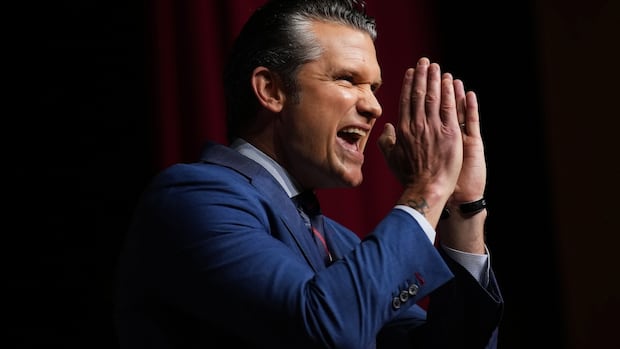In his address to the top U.S. military officials in Virginia earlier this week, War Secretary Pete Hegseth let it be known that the Trump administration is “done with that shit.”
He was referring to the so-called “woke culture” that he said had infiltrated the military.
That a curse word would be used so intentionally and publicly by such a senior political figure is something that would have seemed out of place not too long ago.
But such colourful language among U.S. politicians, particularly during the Trump administrations, seems more commonplace.
Trump himself, who may have toned down his public cursing since entering the presidential race a decade ago, still can let some expletives fly. Indeed, he made political history in June when he became the first president to publicly drop an F-bomb when expressing frustration over the Israel/Iran conflict.
Both countries “have been fighting so long and so hard that they don’t know what the f–k they’re doing,” Trump told reporters.
WATCH | Trump drops F-bomb: 
Trump says he’s ‘not happy’ with Israel or Iran, says they ‘don’t know what the f–k they are doing’
U.S. President Donald Trump, speaking Tuesday as he was leaving for a NATO meeting, expressed displeasure with both Israel and Iran: ‘We basically have two countries that have been fighting so long and so hard that they don’t know what the f–k they’re doing.’
Vice-President JD Vance has also not been shy about cursing, although much of it seems relegated to social media. Just last month, Vance referred to former Obama aide turned popular podcaster Jon Favreau as a “dipshit” regarding his comments about the shooting at an immigration detention centre.
The current administration “is more comfortable perhaps with being more confrontational and therefore using language that would be seen as being more confrontational and more problematic than perhaps other politicians,” said Roger Kreuz, a psychology professor specializing in linguistics at the University of Memphis.
But Democrats are no slouches in the potty-mouth department, and, as some recent headlines have observed, seem to be making a conscious effort to show that they can curse with the best of them.
Asked in August by the popular newsletter Parnas Perspective about Trump extending control over the D.C. police, Senate Minority Leader Chuck Schumer responded: “No f–king way.”
Back in April, a number of Democratic hopefuls ran on a pledge to “unf–k our country” and that the party would “drop the excuses and grow a f‑‑king spine.”
It’s official: I’m running for Congress.
I’ve spent my career holding the powerful accountable as a political and legal journalist. I’m running for Congress to tell you the truth, to fight for New York…and to Unf*ck Our Country.
Join my campaign: https://t.co/JJKPtAsiwB pic.twitter.com/EEwtb9d9io
Sen. Adam Schiff said in March on Jimmy Kimmel Live! that Trump “can go f–k himself.”
And last month, Sen. Kirsten Gillibrand told an audience at New York University that if she and her fellow Democrats are “not helping people we should go the f–k home.”
WATCH | Hegseth curses in speech to top brass:
Secretary of War Pete Hegseth curses in speech to top military brass
U.S. Secretary of War Pete Hegseth said the Trump administration is ‘done with that shit,’ in a speech declaring the end of ‘woke’ culture to top U.S. military officials at a Marine Corps base in Quantico, Va.
Michael Adams, a provost professor of English at Indiana University Bloomington, whose books include In Praise of Profanity, compares today’s political curse culture to the George W. Bush administration. Back in 2004, it was a big political incident when Vice-President Dick Cheney was caught on mic telling Sen. Patrick Leahy: “Go f–k yourself.”
Although Cheney never disavowed the comment, and later said it was one of his proudest moments, it also wasn’t meant for public consumption.
Back then, “everybody was swearing, but pretty much everybody was careful not to swear where they’d be heard publicly,” Adams said.
But when the Trump campaign rolled in around 2015 to 2016, all that changed, as Trump cared not a whit if the public heard him swear, Adams says.
And that became a problem for Democrats.
“They could see that that type of language was being interpreted as sort of the willingness not to follow the rules, because following the rules gets you to the status quo,” said Adams, and back then voters wanted “a big change.”
 Senate Minority Leader Chuck Schumer dropped his own F-bomb in August, referring to Donald Trump’s plans to use troops in Washington, D.C. (Jacquelyn Martin/The Associated Press)
Senate Minority Leader Chuck Schumer dropped his own F-bomb in August, referring to Donald Trump’s plans to use troops in Washington, D.C. (Jacquelyn Martin/The Associated Press)
With both political teams now spewing expletives in public, the U.S. has entered an era in which profanity isn’t just tolerated, it’s campaign strategy, wrote columnist Christian Schneider recently for National Review.
“When politicians across the spectrum swear these days, it’s not a slip on a hot mic but on purpose, part of their brand,” he wrote. “They curse not because they’ve lost their temper. They curse because their social media team ran the numbers.”
Still, Andrew Bates, a past aide to former U.S. president Joe Biden, says some of that cussing comes from genuine frustration.
“The truth is that [politicians] are driven by the same things most people are — like anger at honest folks being denied a fair shot — and we need to prove it by showing fight,” he told Politico in March.
Caitlin Legacki, a Democratic campaign veteran, also told Politico that the key to swearing well, is not to over do it, nor force it.
“If elected officials are going to cuss, they have to mean it. If it’s authentic to who they are and how they’re feeling, voters will probably be fine with it and even relate to it,” she said.
“But if it’s not authentic, there’s nothing more cringe-worthy.”
So far, the profanity train doesn’t seem to have rolled into the Canadian political landscape. Of course, Canada’s elected officials have from time to time been caught cursing, though more often it’s not a planned public utterance, but during heated debate in the House of Commons.
Possibly the most famous, or infamous, was in 1971, when Prime Minister Pierre Trudeau ruffled some feathers after allegedly dropping an F-bomb during one especially rancorous debate. He later insisted he had used the word “fuddle-duddle.”
Perhaps the closet recent thing to public cursing was last year’s YouTube video by Conservative Leader Pierre Poilievre. The video was titled “I Call BS” and criticized the Trudeau government over housing costs. (Only the initials were used, and the full curse word never spoken.)
Whether this U.S. political swear trend will make its way north is hard to say. But it’s doubtful it will be leaving American politics anytime soon.
“I’m not sure that you can really stop that,” Adams said. “I don’t think that swearing is going to go away generally. If we accept that politicians are going to be part of general culture then we won’t be surprised when they’re swearing.”
